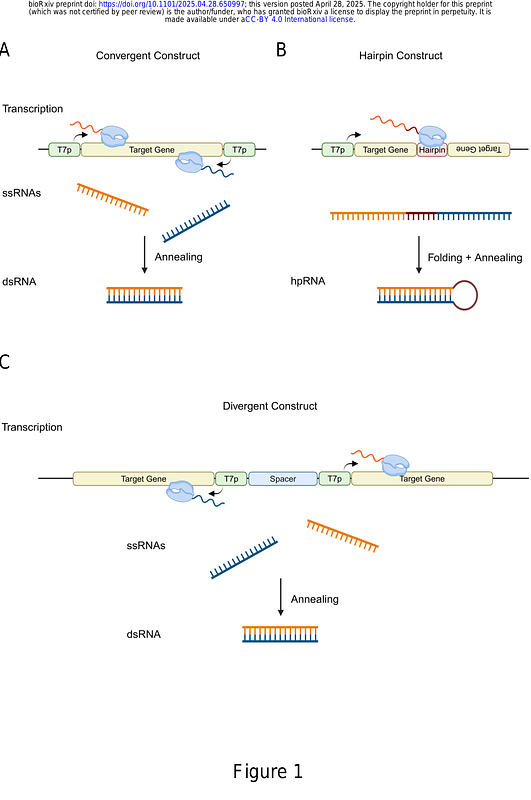Comparative analysis of convergent and divergent T7 RNA polymerase promoters for the synthesis of dsRNA in vivo and in vitro

Comparative analysis of convergent and divergent T7 RNA polymerase promoters for the synthesis of dsRNA in vivo and in vitro
Ross, S. J.; Ray, J.; Kilby, P. M.; Dickman, M. J.
AbstractDouble-stranded RNA plays a key role in various biological processes. The discovery of RNA interference, a gene-silencing mechanism, revolutionised the study of gene function. dsRNA has since been used in novel therapeutics and as an agricultural biocontrol alternative to chemical pesticides. Microbial production typically involves expression systems with convergent T7 promoters. However, convergent transcription from DNA-dependent RNA polymerases can lead to transcriptional interference. In this study, we designed multiple plasmid DNA constructs to investigate the effect of convergent and divergent T7 RNA polymerase production of dsRNA via in vitro transcription and in vivo in E. coli, prior to dsRNA yield quantification and analysis of product quality. We demonstrate that higher yields of larger dsRNA are typically obtained using convergent promoters during in vivo production. A typical fold increase of 2.1 was obtained for dsRNA > 400 bp. However, production of smaller dsRNA (< 250 bp) by divergent promoters resulted in increased yields (2.2 fold). Furthermore, our data demonstrates that in vitro transcription production of dsRNA using divergent T7 promoters results in significantly higher yields of dsRNA, with a maximum fold increase of 6.46. Finally, independent of size, we demonstrate that dsRNA synthesised from DNA templates with multiple transcriptional terminators, compared to run-off transcription, improved the quality and purity of dsRNA due to decreased formation of dsRNA multimers or aggregates. This study highlights alternative optimal strategies for the production of a wide range of different sized dsRNA both in vitro and in microbial systems